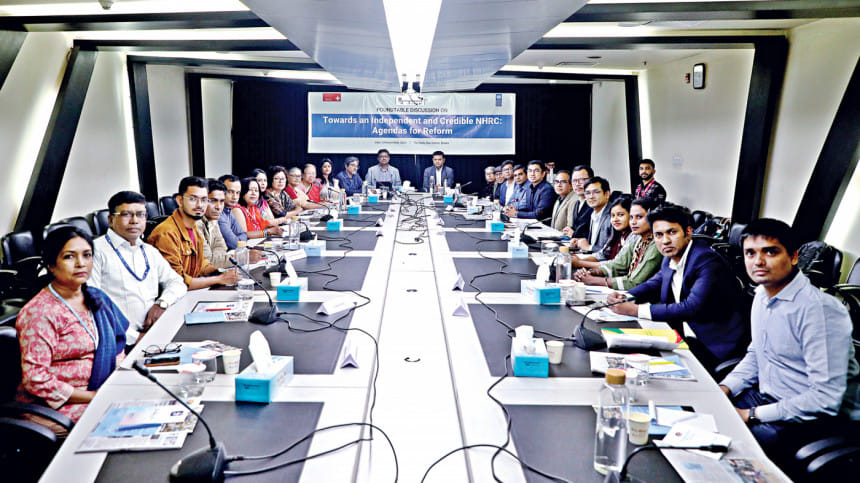NHRC must be free from political, state influence

National Human Rights Commission should be independent and people-centric, said speakers at a roundtable yesterday.
The commission must take a decentralised approach to effectively address human rights violations, they added.
They also recommended strengthening the commission's investigative powers, improving its structural capacity, and ensuring its independence from political and bureaucratic influence.
A toothless commission, with no executive power will remain ineffective, merely existing as a symbolic body with no real impact.
The remarks were made at the event, titled "Strengthening NHRC: Towards an Independent and Credible Oversight Body", jointly organised by UNDP and The Daily Star at The Daily Star Centre.
Supreme Court lawyer Jyotirmoy Barua highlighted significant challenges in the practical implementation of the National Human Rights Commission Act, 2009, despite its provision of statutory independence.
He noted flaws in the appointment process, where the president, guided by a government-influenced selection committee, appoints NHRC members.
Dhaka University Law Professor Sheikh Hafizur Rahman (Karzon) said NHRC was established more as a formality than with a meaningful goal.
"The NHRC should function as an independent watchdog. Unfortunately, the commission was weakened over the past 15 years, failing to hold law enforcement or state officials accountable," he said.
"A toothless commission, with no executive power will remain ineffective, merely existing as a symbolic body with no real impact," he added.
Dr Kazi Maruful Islam, professor of development studies at Dhaka University, also stressed that people within the NHRC must be held accountable.
"To make the institution more people-centric, it must strengthen its engagement with people," he said.
Bangladesh Mahila Parishad General Secretary Maleka Banu said the NHRC was born from long advocacy and activism, with women at the forefront of its establishment.
"However, the institution has failed to live up to its vision. The NHRC must take responsibility for addressing the numerous human rights violations occurring daily. Recruitment should prioritise experts who are sensitive to women's rights and gender issues," she added.
Prothom Alo Joint Editor Sohrab Hasan said that when powerful entities, such as the state or political parties, violate human rights, the NHRC struggles to address it.
"The NHRC must be independent in every sense -- free from political or state control -- and willing to take bold actions to hold the powerful accountable," he said.
Naripkkho founding member Shireen Huq expressed her disappointment regarding the NHRC's failure to address critical issues like the death penalty, which is a gross violation of human rights.
Additionally, the commission must have the power to conduct independent investigations into all forms of violations, she stressed.
Sabina Yasmein Lubna, senior programme manager at Swiss Agency for Development and Cooperation (SDC), Embassy of Switzerland, also said that their evaluations have revealed systemic flaws in NHRC recruitment and capacity-building.
"Many members lack the necessary expertise, and budgets are often underutilised. This inefficiency undermines the commission's effectiveness," she added.
NHRC Secretary Sebastin Rema said while we have high expectations of the NHRC, the organisation needs structural reform to strengthen its impact.
Dr Kamal Uddin Ahmed, former NHRC Chairman, acknowledged the commission's rigid structure, likening it to an authoritarian setup.
"We want an independent NHRC, but challenges persist. Staff fall into a gray area without proper benefits, and despite provisions for its own budget, this is not implemented," added.
He criticised inefficient budget allocations, saying, "Funds are unavailable for essential activities, while allocated elsewhere unnecessarily."
Dr Kamal called for removing budgetary constraints to enable the NHRC to fulfill its mandate effectively.
The event was moderated by Tanjim Ferdous, in charge, NGO and Foreign Mission, The Daily Star.

 For all latest news, follow The Daily Star's Google News channel.
For all latest news, follow The Daily Star's Google News channel. 


Comments